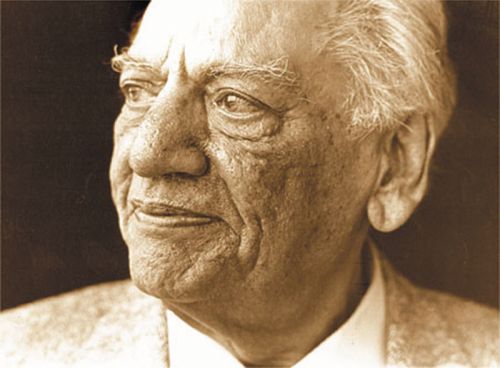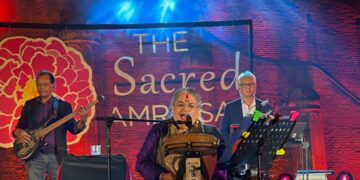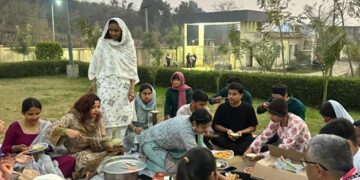FAIZ FEST Series –I

When Indian author Avinash Kishore wrote- “Sometimes I think, Pakistan’s dictators did a great favour to Urdu poetry by jailing Faiz Ahmed Faiz!” An affront, distasteful, audacious, cheeky, arrogant and outright blasphemous to utter. You would be shocked! But, from a visionary perspective, “During his long incarceration, a peerless string of Urdu poetry gushed from the pen of Faiz!” Kishore validated. Indeed Avinash Kishore’s provocative statement suggested how the pinnacle of creativity emerges from deep suffering, leading to Faiz’s most iconic works, and the complex relationship between adversity and artistic greatness. Faiz wrote his incomparable pieces in confinement. “Dil na umeed toh nahi, nakam hi toh hai; Lambi hai gum ki sham, magar sham hi toh hai..” (The heart isn’t hopeless, its merely unsuccessful, long maybe, the twilight of suffering, but, it’s merely a fleeting dusk).
In the crisp February air of 2025, the Faiz Festival flowered as a literary spring resembling the tender florets that cupped their fragrance and colours and mesmerized a ‘Bahar’ infused Lahore. Lahore- the city of culture and arts, brimmed with unfiltered joy at his time of the year- a hometown of the Great poet Faiz Ahmed Faiz, in Pakistan. And in its midst, Lahore’s Alhambra Hall’s canvas was coloured with poets, artists, writers, actors, instrumentalists, dancers, and literary personalities, who descended from varied corridors of life. At the sprawling venue, one walked into cascades of gaily festooned panaflexes bearing images and verses of Faiz’s lilting poetic rhythm. His poems turned into mellifluous melodies by the likes of Noor Jahan, Iqbal Bano, Mehandi Hassan, Nayyara Noor, Abida Parveen, Aadil Hashmi and others, wafted unshackled, enveloping one in its candescent, exciting flavours. Salima Hashmi the eldest daughter of the great Faiz, and Chairperson of the Faiz Ghar Foundation, jubilant in the radiant atmosphere expressed -“We have ignited and started the fire, it is for others now to carry this flame of knowledge and organize Faiz Fests in every corners of the country and abroad”. Faiz, considered the united treasure of both countries from pre-partition times, drew nearly 31 Indian hearts to celebrate his impassioned poetry emerging from a free soul that resonates to this day and age. This is the 9th Faiz Festival. And for me, from across the border in India, coincidently, a pause of 9- years, since I last, stepped in Pakistan’s Lahore, instantly felt the pangs of …a Lambi Judai…
A poetry discussion between three precious, revered, classic souls of the Fest, Zehra Nigah, Dr Arfa Sayeda Zehra, and Iftikhar Arif, Faiz’s famous words resonated in a jam-packed hall, —“Ye Daagh Daagh Ujaalaa .. Ye Shab Gazida Sahar, Vo Intezar Thaa jis-kaa, ye vo Sahar To Nahi..” (This stained light, this half-bitten dawn, Is not the dawn, we had long awaited..) Poetess, and scriptwriter Zehra Nigah with Educationist Dr Arfa- and distinguished Poet Arif, regaled a discerning audience even as notable names in literature, Kishwar Naheed, Dr Saif Mehmood, Dr Shamoon Hashmi were seen. Nigah, recited her exceptional Sha’airi – “Hum bhi kuch jaldi mein they, tum bhi kuch jaldi mein they, aur waqt bhi jaldi mein tha. Aur iss tarah teeno adhure reh gaye..” The highlight of the day being her heartrending poetry where a bludgeoned baby in the womb talks to her mother turning every eye wet.
“Mein Bach Gai Maa…
Tere kache khoon ki mehandi mere por por mein rach gayi Maa,
Mein bach gayi Maa,
Garr mere naksh ubhar aty, woh tab bhi lahoo se bhar jaate,
Meri Ankhein roshan ho jaati, toh tezaab ka surma lag jaata.
‘Satte-vatte’ mein baat jatti
Ya ‘kari’ mein kaam aa jaati.
Har kwaab adhora reh jata
Mera kadd thora sa barrta, Mere baap ka kadd chota parta,
Meri chunni sarr se dhalak jati, Mere bhai ki pagri girr jati.
Teri Lori sunne se pehle mein so gayi Maa,
Anjaan nagar se aii thii, anjaan nagar mein khoo gayi.
Maa Mein Bach Gai Maa…”
(I have been saved, Maa….
The Henna of your unripe blood has coloured every pore of my being.
Had my features emerged, they would have brimmed with blood.
Had my eyes learnt to see, they would have been rimmed with ‘Surma’ (kohl) of acid.
I would have been bartered in ‘satta –vatta’ (give and take of brides) or used up in ‘Kari’ (Honour Killing)
Every dream of mine would have remained unfulfilled.
Had I gained height, my father would have shrunk in his.
Had my veil slipped just a little from my head, my brother’s turban would have fallen in shame.
Before hearing your lullaby, I slept in my slumber
I arrived from a strange land and have departed to a strange land.
Maa, I have been saved, Maa…
Inspiring, Thought-provoking events
Along with the poignant sessions, a stimulating session saw eminent translator Astri Ghosh from Goa, Dr Anjum Altaf and Prof Shaista Sirajuddin reflected on translating the Poetry of Faiz importantly in a non-Indic-Norwegian language by Astri. Ilona Yusuf, Associate Editor of Aleph Review, moderated the session that underscored translations as a vital means of preservation of narratives. Discussions about ensuring the Indigenous idiom retains its true flavour in its glory and purity, along with the ultimate goal of the right emotion, rhythm, sound and imagery, in another language.
UK-born youngster Jamal Akbar from Pak unveiled his prized vintage collection of India-Pakistan films from 1947 to 1980 that used Faiz’s poetry to create unforgettable melodies, for a discerning audience.
Earlier, Jamal gifted a rare set of archaic postage stamps of Noor Jahan printed by Pakistan in memory of the nightingale of Pakistan, to an Indian admirer of Noor Jahan, famed documentary filmmaker Karan Bali from Mumbai. Jamal received a T-shirt with an imprint of Noor Jahan on it by Karan, ‘which was, of course, to be framed as a memory piece’, Karan told me smilingly while relating how the two young fans of Noor Jahan on either side of the border connected virtually first.

During the session, Karan expressed his feeling of homecoming in Pakistan. “My paternal grandmother, was a gynaecologist from Sialkot while grandfather was a Photo studio owner, at Lahore’s famous Mall Road”. There was amused appreciation when Karan spoke of his grandfather JN Bali’s success rate of 75% for arranged marriages taking place based on his skill as a portrait photographer. From Kisse- Kahaiyan’ (anecdotes) from the life of Noor Jahan- the nightingale of Pakistan and his ancestry from various areas of Pakistan Karan’s famous additive was – “My grandmother Dr Damayanti Bali, the gynaecologist, a poetess, says half of Lahore’s gentry was born in her hands!” drew a standing ovation from a surprised and delighted crowd. Karan ended the session with – I am a Punjabi and I am setting foot in my two Punjabs on both sides for the ‘first time’ and at the ‘same time’ – NOW!!
Television, print, and other media swarmed the venue. And, the inimitable Adeel Hashmi, filmmaker, actor, writer and grandson of Faiz, during an interview, smiled and nodded: “Along with spreading literature we are kind of, tenderly ‘accused’ of promoting cultural tourism, yes, people travel here to witness the rich culture of Pakistan along with the arts, and we are proud!”Indian writer and actor Atul Tiwari paid rich tributes to the late Indian film director Shyam Benegal — whose vision excelled in every frame. A 6th-time appearance at the Faiz Fest series out of nine, Tiwari spoke about the challenges of writing a screenplay in Indian cinema, as a vast ocean, widespread, cauldron of languages and dialects, each demanding distinct, diverse treatment.”

While Kausar Munir – inimitable, award-winning Indian lyricist known for her hit compositions –‘Phero naa najariya’, Pareshaan’, ‘Suno na Sangemarmar’, ‘Ishqzaade’, ‘Falak Tak’, ‘Manna ke hum yarr nahi’, spoke on the relevance of fine-tuning poetry to put it to music. Noted Pak journalist Beena Sarwar heading the South Asian Peace Action Network (SAPAN), said she had always stood for the South Asia Union and soft borders to savour and celebrate similarities and differences of the people with the same DNA. Abbas Tabish regaled with his commonplace endearing poetry – “Ek mudaat se meri maa nahi soey ‘tabish’, meine ek barr kaha tha mujhe darr lagta hai”. (For aeons my mother didn’t sleep a wink, I had once told her that I was scared)Harpreet from Mumbai attracted crowds on the open stage as he crooned Sufi music and Faiz poetry strumming soulful music on his guitar.
Sessions at Fest brought the legend of Manto to life — Saadat Hasan Manto, one of the finest writers to write on partition, a combined treasure of both divided countries, hence his Biopics from both countries, were discussed in a stimulating perspective by Indian actress-writer, director of film ‘Manto’ Nandita Das and her Pakistani counterpart Sarmad Khoosat. Both their films viewed Manto’s genius through different but complementary lenses. It was a dream to hear Adeel Hashmi read out Faiz’s poetry in his AmitabhBachchanisque baritone and Navid Shahzad recite the same in her flawless English, a translation of Faiz’s poetry by late Shoaib Hashmi- replete with imagery, lyrical subtleties and artistic finesse, so challenging in a foreign language. (To Be Concluded)
- The author can be reached at rashmitalwarno1@gmail.com







